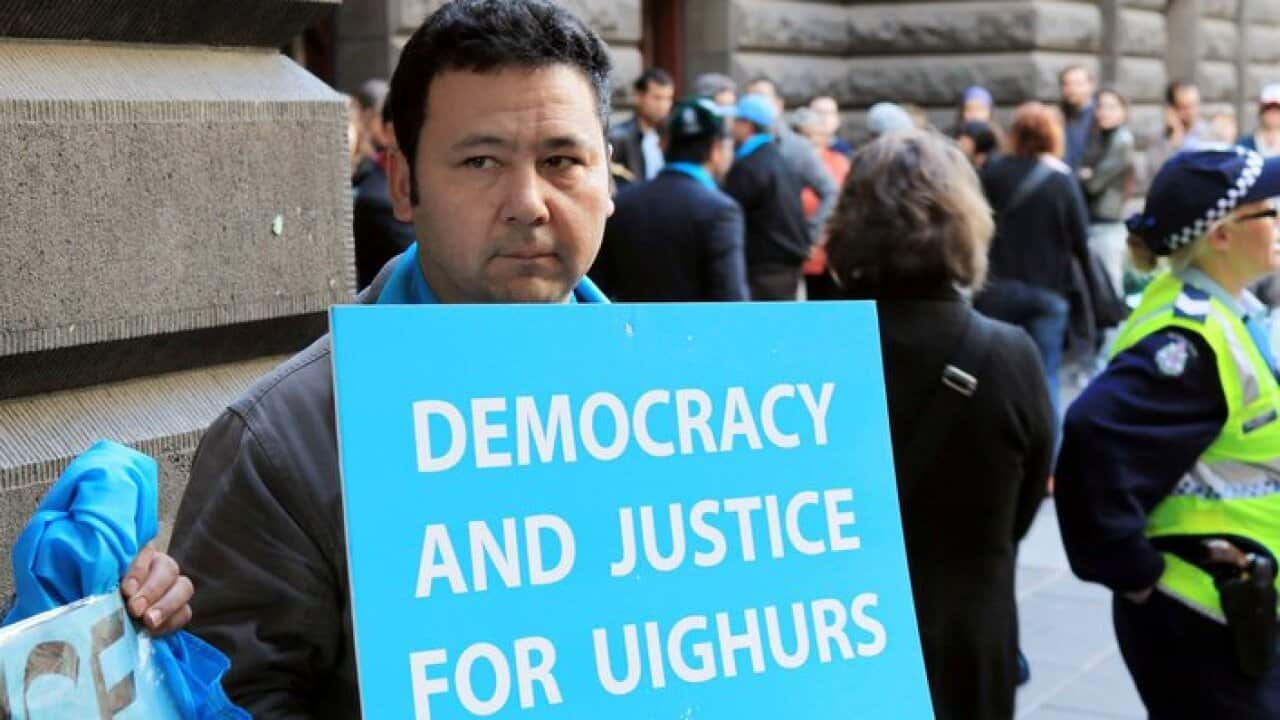The videos are only 15 seconds long. Nothing is said, and the same unsettling music tinkers in the background - a Turkish film score by composer Aytekin Ataş.
The name of the song 'Dönmek' means 'return'.
It is the latest social media campaign used by Uighurs, a Muslim Turkic minority, to share the stories of their friends and relatives detained in camps in Xinjiang, in China’s north-west. The last campaign, , was started in February on Twitter by those living outside of Xinjiang – appealing for information about their loved ones back home.
The last campaign, , was started in February on Twitter by those living outside of Xinjiang – appealing for information about their loved ones back home.

Source: TikTok
But this time, it’s Uighurs actually in Xinjiang who are sharing their stories – albeit, silently.
Douyin and TikTok are not the first places you'd expect to see a human rights crisis highlighted. It’s demographic is mostly teenagers, sharing viral content.
The video apps are owned by the same Beijing-based tech company and are usually used to spread memes, animal videos, and lip-sync clips. But while Douyin is the local Chinese version of the short video app, TikTok is its international offering, allowing stories to be spread further afield.
But while Douyin is the local Chinese version of the short video app, TikTok is its international offering, allowing stories to be spread further afield.

Source: TikTok
And it's one of the world’s most popular apps – last year, it was the most downloaded iOS app and has been downloaded more than one billion times.
'They want to be heard'
Arslan Hidayat is a Uighur-Australian living in Turkey.
In March, , a famous comedian, who he has not spoken to since November last year.
Mr Hidayat has been compiling some of the Douyin and TikTok videos from Uighurs and sharing them on Twitter. “They aren’t saying anything in these videos, but they want to be heard,” he told SBS News.
“They aren’t saying anything in these videos, but they want to be heard,” he told SBS News.

Arslan Hidayat and his father-in-law Adil Mijit. Source: Supplied
“They want Uighurs outside of Xinjiang to understand what they are going through. It is difficult to get information out of Xinjiang, so to me, this is like a note in a bottle.”
In one video, an image of four men can be seen in the background, with a young woman in the foreground holding up four fingers and crying.
It’s unclear who the men are, but Mr Hidayat said she is probably appealing for information about four missing members of her family. Human rights groups estimate more than a million Uighurs are held in camps scattered throughout Xinjiang.
Human rights groups estimate more than a million Uighurs are held in camps scattered throughout Xinjiang.

Source: TikTok
Beijing has denied the existence of internment camps, and long insisted that they are simply running training centres for Uighurs to learn new skills.
Late last month, a senior government official in Xinjiang said 90 per cent of those who had been in the facilities have since left and found employment.
“The situation in the centres is fluid, as people come and go,” Alken Tuniaz, vice-chairman of the Xinjiang government, said at a press conference in Beijing.
“Most of them have completed their study and found new jobs.”
The experiences of Uighurs came under the spotlight late last month when 22 ambassadors to the United Nations signed a joint letter calling on Beijing to stop arbitrarily detaining people in Xinjiang.
Beijing promptly responded with a letter signed by 37 countries, backing its policies in Xinjiang.
Is TikTok censored?
ByteDance launched Douyin in 2016 - it is now one of the most downloaded apps in China.
A year later, the company took the concept overseas - launching TikTok - an app that functions almost exactly the same but for users all over the world. "Essentially, they are the same app - but one is within the firewall and one is outside of it," Fergus Ryan from the Australian Strategic Policy Institute explained.
"Essentially, they are the same app - but one is within the firewall and one is outside of it," Fergus Ryan from the Australian Strategic Policy Institute explained.

TikTok is popular with teenagers. Source: Getty Images Europe
"But there is still anecdotal evidence to suggest there may be censorship going on within TikTok. In general, the Chinese Communist Party can't help but use the leverage it has to manipulate what kind of content goes out."
The company has said the data of TikTok users is now stored outside of China and the government does not have access to it.
"When people looked at their privacy statement, it was the case originally that data was being sent back to Beijing," Mr Ryan said.
"I would still argue that we need to see evidence that has changed." Mr Hidayat said he is not sure if the videos will stay on TikTok and Douyin - but acknowledged those who posted them understand the risk they take in sharing their story - regardless of what app they use.
Mr Hidayat said he is not sure if the videos will stay on TikTok and Douyin - but acknowledged those who posted them understand the risk they take in sharing their story - regardless of what app they use.

Source: TikTok
"The videos could be restricted or taken down, that is normal," he said.
"These people in the videos, they know it is a risk to post these videos, but these social media campaigns are an opportunity to keep the issue alive, when it drops off."
"So many people still don't know who Uighurs are."












